Viewpoint: India court disregards woman's right to choose husband
- Published
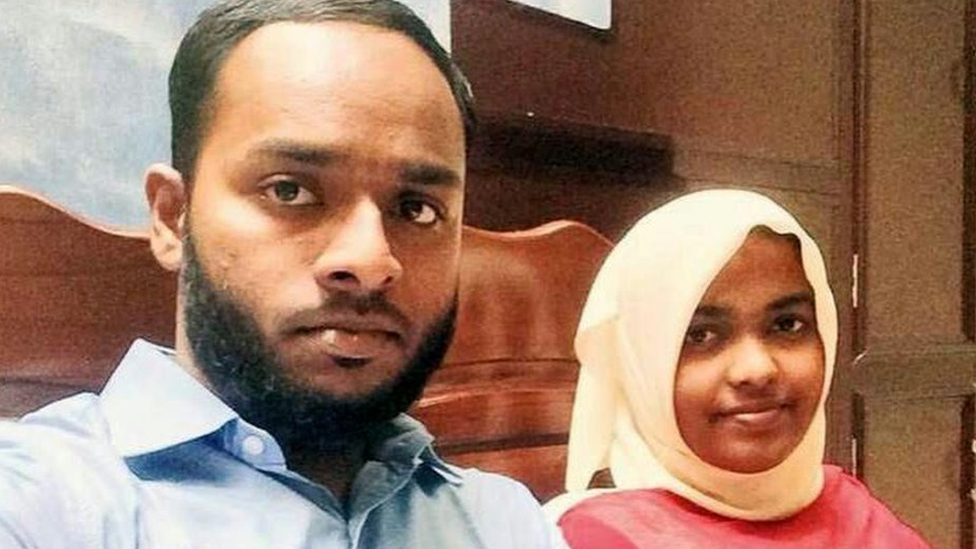
The case revolves around the inter-faith marriage of Hadiya and Shafin Jahan
A Hindu woman who converted to Islam and married a Muslim man has been waiting for months for India's courts to recognise her marriage after they annulled it. Flavia Agnes, a women's rights lawyer, argues that the courts have consistently disregarded the woman's fundamental rights.
India is embroiled in a political controversy which concerns the private lives of two adults - Hadiya and Shafin Jahan - who contracted an inter-faith marriage with consent.
The marriage might have been a routine affair which occurs in metropolitan cities, but for the fact that Hindu nationalists have been projecting inter-faith marriages between Hindu women and Muslim men as "love jihad".
The term "love jihad" conveys a carefully crafted political ploy by Muslim men to entice Hindu women for the sole purpose of conversion. This venomous propaganda has been wreaking havoc in the lives of young couples in India in recent times.
India is a secular country. The Indian constitution grants every adult the right to practice the religion of their choice.
It also provides for inter-faith marriages with or without conversion. A marriage between adults contracted with consent can be dissolved only at the behest of either or both parties to the marriage and not by a third party.
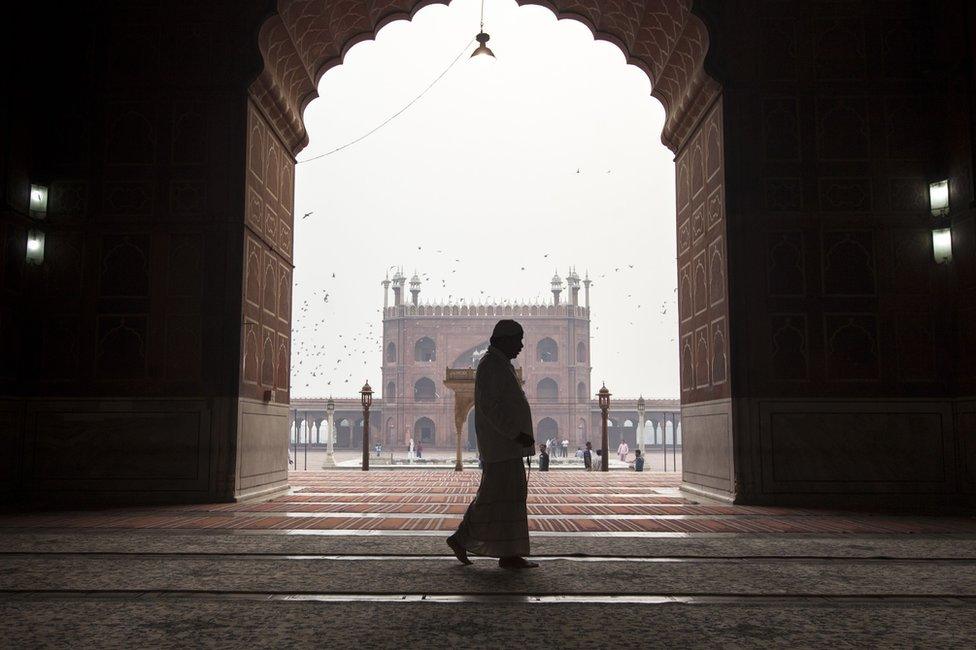
India is home to the second largest Muslim population in the world
And yet, these fundamental rights are negated in the present case.
The controversy is set in the southern state of Kerala where the right-wing Bharatiya Janata Party (BJP) is trying to gain a foothold.
The state has a sizeable Muslim population, it's one of the few in India where Muslims have a political voice. There have also been news reports of radicalisation of Muslim youth in the state.
This is the background in which the controversy over the marriage of Hadiya and Shafin Jahan is set.
Ms Jahan, 24, was born a Hindu and converted to Islam in January 2016. She changed her name from Akhila to Hadiya.
Since then her father has been waging a legal battle to prove that her conversion and marriage were not of her own free will and that she was "indoctrinated".
Ms Jahan appeared before the Kerala high court in response to a petition filed by her father and testified that she had converted and subsequently married out of her own free will.
But in May 2017, the court termed it a "sham marriage" and annulled it. Terming Hadiya "weak and vulnerable", the court confined her to the custody of her parents.
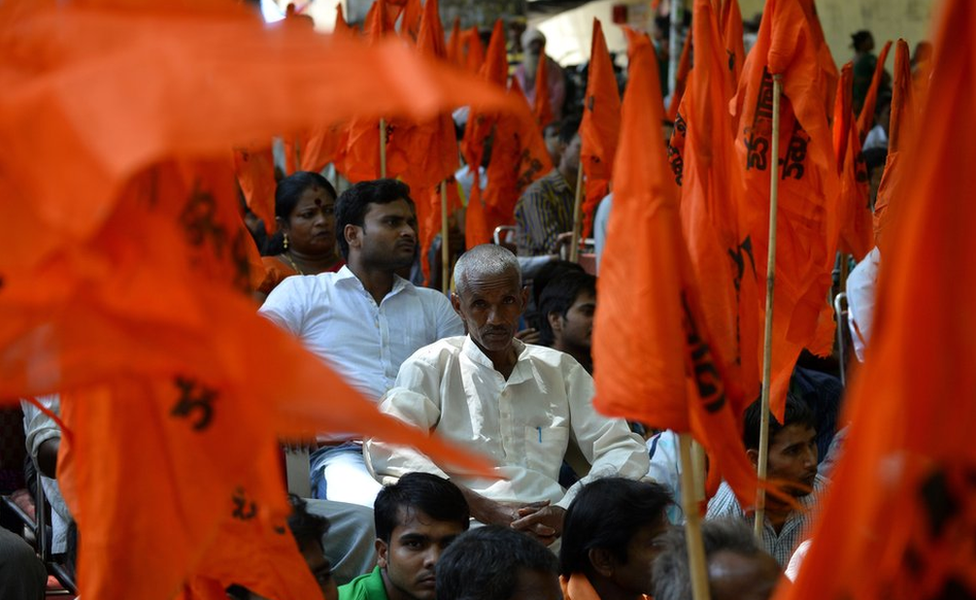
Radical Hindu fringe groups have held protests against an alleged "love jihad" movement
Two months later, the case reached the Supreme Court when Mr Jahan challenged the high court verdict, stoking debates on the jurisdiction and power of the courts in the personal lives of adults.
However, instead of focusing on the primary issue of annulment of a marriage contracted by choice, the court ordered India's National Intelligence Agency to probe the incident, creating yet another controversy.
The court was apparently swayed by the comments of the Kerala high court that there were radical groups influencing and converting young Hindu women.
The court declined the plea made by her lawyers to interview Ms Jahan and she continued to be in the custody of her parents.
Finally, when the case was heard on 27 November, Ms Jahan was asked to be present. However, the court took two hours to concede her right to be heard.
When she made a naive comment that her husband should be appointed as her legal guardian instead of her father, to whose custody she had been relegated by the Kerala high court, one of the judges responded, "No husband can be guardian of his wife."
He then asked senior advocate Kapil Sibal, who was representing the couple, to explain to her that a wife is not chattel, that she is an individual entitled to her own status in society.
But what transpired in court that day suggests that even the highest court in the country is not fully convinced about a woman's freedom and autonomy to contract a marriage of choice, against the wishes of her parents.
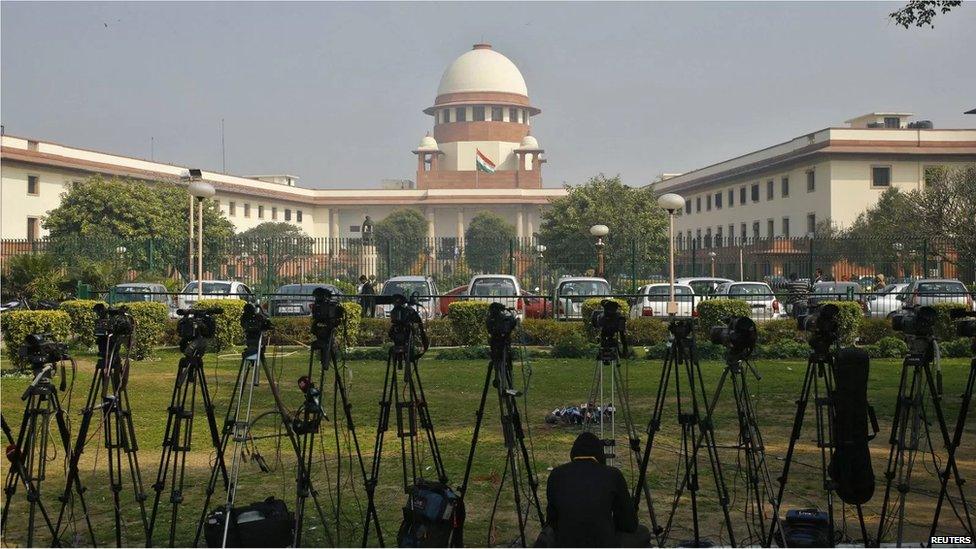
The couple appealed to the Supreme Court, which is now hearing the case
The lawyers defending the rights of the couple said that it was a victory of sorts since all they wanted on that particular day was to secure Ms Jahan's freedom and to end the custody arrangements which had forced her to return to her parental home.
The simple logic that a woman is not chattel seems to have eluded India's courts then.
Many people saw this as a case of gender discrimination. However, the Supreme Court, steeped in its own brand of patriarchy, failed to see the role of its own judgment in undermining the right of an adult woman to autonomy and personal freedom.
The court kept vacillating about granting Ms Jahan, who had travelled from Kerala to Delhi to appear in court, her right to be heard in her own case, even while making comments about her life and her choices.
It is astonishing how the court failed to see the issue clearly as one of gender injustice and denial of the personal freedom of women in matters concerning marriage.
Instead of being "weak and vulnerable", what came through that day in court was the sterling quality of Ms Jahan and her ability to withstand pressure from her family, the media and the judiciary over several months as she answered in a clear voice that she wanted her freedom, and that she wanted to keep her faith and complete her education.
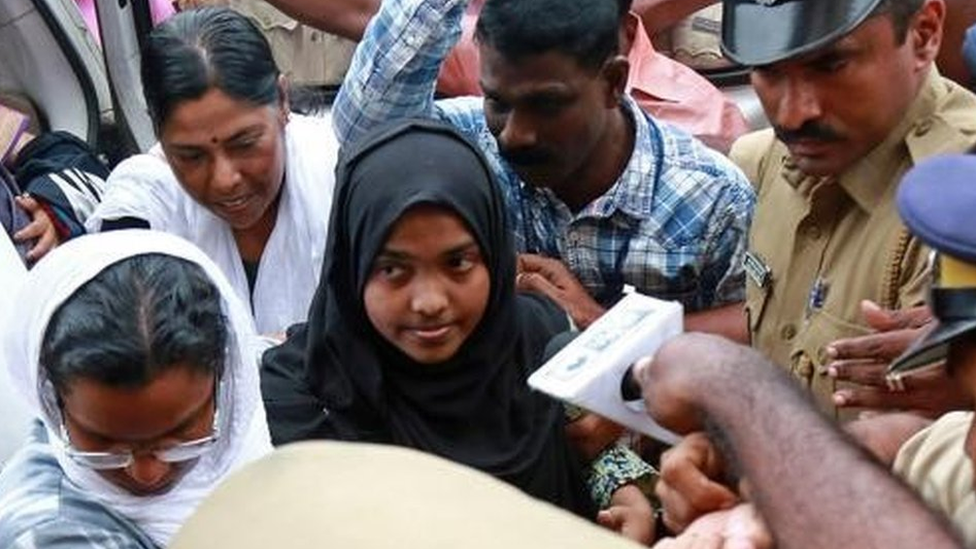
The court has negated Ms Jahan's fundamental rights
A few months earlier, during the controversy over triple talaq or Muslim instant divorce, Indian media was lamenting the fact that a Muslim woman is denied rights and agency, and that she is a victim of Islamic patriarchy.
In the present controversy it appears that it is the Hindu woman who lacks agency and can easily be "brainwashed". What is projected while terming marriages of Hindu women to Muslim men as "love jihad" is that Hindu women are incapable of making intelligent choices.
Further, since a woman is not able to decide what is good for her, it is the father who must decide for her and without his consent, her marriage is not valid.
The "love jihad" bogey has been effectively used by the right-wing Hindu nationalist groups such as the Rashtriya Swayamsevak Sangh during election campaigns in several states.
What is disturbing in the present controversy is that even the courts seem to be endorsing such Hindu right-wing terminology.